

Most ebook files are in PDF format, so you can easily read them using various software such as Foxit Reader or directly on the Google Chrome browser.
Some ebook files are released by publishers in other formats such as .awz, .mobi, .epub, .fb2, etc. You may need to install specific software to read these formats on mobile/PC, such as Calibre.
Please read the tutorial at this link: https://ebookbell.com/faq
We offer FREE conversion to the popular formats you request; however, this may take some time. Therefore, right after payment, please email us, and we will try to provide the service as quickly as possible.
For some exceptional file formats or broken links (if any), please refrain from opening any disputes. Instead, email us first, and we will try to assist within a maximum of 6 hours.
EbookBell Team

5.0
100 reviewsThis book is a critical appraisal of the status of the so-called Climate Sciences (CS). These are contributed by many other basic sciences like physics, geology, chemistry and as such employ theoretical and experimental methods. In the last few decades most of the CS have been identified with the global warming problem and numerical models have been used as the main tool for their investigations. The produced predictions can only be partially tested against experimental data and may represent one of the reasons CS are drifting away from the route of the scientific method. On the other hand the study of climate faces many other interesting and mostly unsolved problems (think about ice ages) whose solution could clarify how the climatic system works. As for the global warming, while its existence is largely proved, scientifically it can be solved only with a large experimental effort carried out for a few decades. Problems can arise when not proved hypotheses are adopted as the basis for public policy without the recognition that they may be on shaky ground. The strong interactions of the Global Warming (GW) with the society create another huge problem of political nature for the CS.
The book argues that the knowledge gained so far on the specific GW problem is enough for the relevant political decisions to be taken and that Climate Science should resume the study of the climate system with appropriate means and methods. The book introduces the most relevant concepts needed for the discussion in the text or in appropriate appendices and it is directed to the general public with upper undergraduate background. Each chapter closes with a debate between a climate scientist and a humanist to reflect the discussions between climate science and philosophy or climate scientists and society.